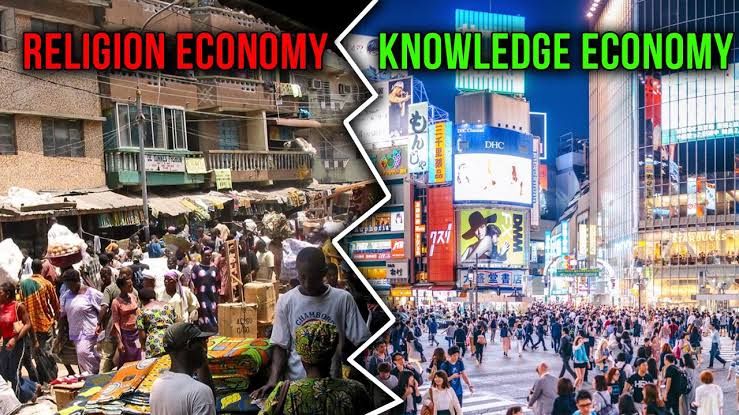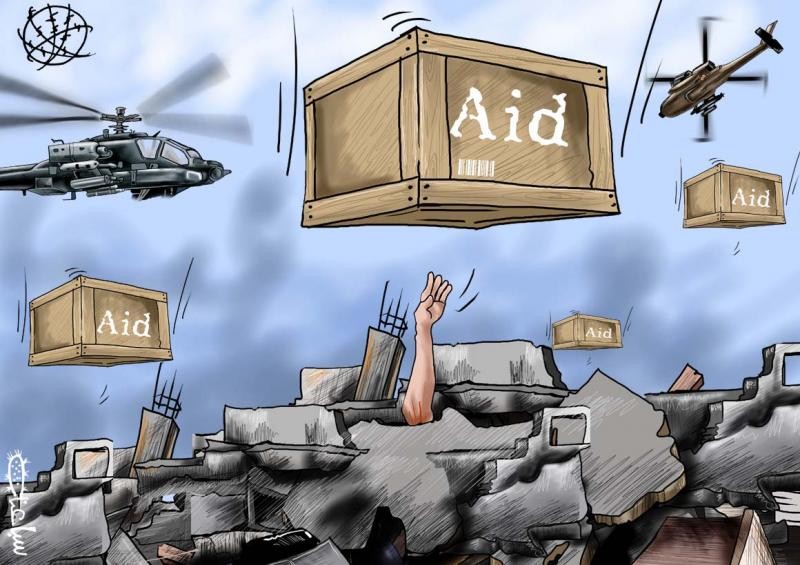Knowledge Economy Vs. Religion Economy - Between Nigeria And The World

In today's world economy, the contradiction between the Knowledge Economy and the Religion Economy presents a compelling narrative that determines every nations' development. While some countries' development relies on their innovation, scientific advancement, and investment in education skills, Nigeria seems stuck in a cycle of dependency on religious favor, neglecting the human intellect and creativity they are blessed with.
Nations practicing the Knowledge Economy are nations that have harnessed the power of human intellect, innovation, and education to drive economic growth and prosperity. They are trained to ask questions, research, and proffer solutions regardless of the situation. Japan, a true example, stands as a proof to the transformative potential of the Knowledge Economy. Even with its lack of substantial natural resources, Japan leveraged its skills in technology, research, and development to emerge as one of the world's most prosperous nations, with zero tolerance for religious extremists.
In contrast to Nigeria's reliance on divine intervention, Japan's success is based on critical thinking, problem-solving, scientific research, and continuous learning. Japanese society has always prioritized education, investing heavily in research institutions, and promoting a conducive environment for technological innovation and development. This has not only helped Japan sustain its economy but also influenced its global markets with its rapid advancements in automotive, electronics, and robotics industries.
On the opposite, the Religion Economy shows a cycle of dependency on divine intervention while neglecting the promising potential of human intellect and ingenuity. Nigeria, often cited as one of the world's examples, grapples with systemic issues stemming from her over-reliance on religious faith to address socio-economic challenges. Coveting the development of other countries while asking “God When?” without taking any steps towards emulating the development process. Despite being blessed with abundant natural resources, over sixty years after independence, Nigeria lags behind in overall development, plagued by corruption, poverty, and infrastructural decay, and still categorized as a developing country.
The continuous collapse of industries and the rise in the number of religious institutions in Nigeria proves the influence of the Religion Economy, where leaders and citizens await divine interventions for intellectual solutions. The reliance of Nigerians on faith-based solutions not only deters progress but also increases the socio-economic disparities, degrading Nigeria to the level of the "poverty capital of the world."
Using Israel and Saudi Arabia as case studies proves the notion that religious affiliation prevents economic prosperity. Despite their religious significance as the birthplaces of Christianity and Islam, respectively, both nations embraced the Knowledge Economy, leveraging innovation, and strategic investments to bolster their economies.
Israel is renowned for its development of technology and defense, signifying the cordial relationship between knowledge and economic development. Through investments in research and development, Israel has emerged as a global leader in cybersecurity, agriculture, and medical technology, promoting economic growth and technological innovation.
Similarly, Saudi Arabia and the UAE have made significant strides in diversifying their economies beyond oil dependence, they prioritize investments in education, infrastructure, and technological innovation. The UAE, in particular, is currently known as a hub for innovation and entrepreneurship, catalyzing economic growth through initiatives such as Dubai's Knowledge Village and Abu Dhabi's Masdar City.
In contradiction to the successes of Japan, Israel, Saudi Arabia, and the UAE, Nigeria's adherence to the Religion Economy has enabled a cycle of underdevelopment and stagnation. Despite its vast potential, rather than development, Nigeria continues to grapple with several minor issues ranging from corruption and unemployment to inadequate infrastructure and healthcare- all man-made issues that can be solved with human intellects and research if well funded, yet citizens await divine intervention for solutions.
Rather than provide funding for development, Nigerian leaders continue to allocate substantial resources for religious tourism and religious infrastructure. In 2022, A Nigerian state governor spent 24 Billion Naira on erecting a worship center in the oil rich Niger/Delta region when the people have no access to pipeborne water. Same year, another state governor subsidized Hajj pilgrimages for citizens to the tune of #20billion. These further buttressed the point of Nigerian leaders' misplaced priorities. This money could have been invested in education, research, innovation, and sustainable development. Rather, Nigeria squanders resources on religious issues that offer fleeting solace but do little to address the root causes of poverty and underdevelopment.
The comparison of the Knowledge Economy and the Religion Economy serves as a wakeup call for Nigeria to reassess their economic priorities and embrace knowledge and innovation, the path to development and growth. While religious faith and spirituality hold huge value for the citizens and should not be ignored, they must not overshadow the nations’ investment in human capital, education, and technological advancement.
Nigeria, blessed with millions of intellectuals who are sought after all around the globe, should harness its abundant resources and human potential to advance herself towards prosperity and national development. Embracing the Knowledge Economy by prioritizing investments in education, research, and infrastructure, Nigeria can transcend the bondage of the Religion Economy and fully embrace her title as the ‘Giant of Africa’.
Maxwell Adeyemi Adeleye sent this piece from London, United Kingdom. He can be reached via [email protected].



